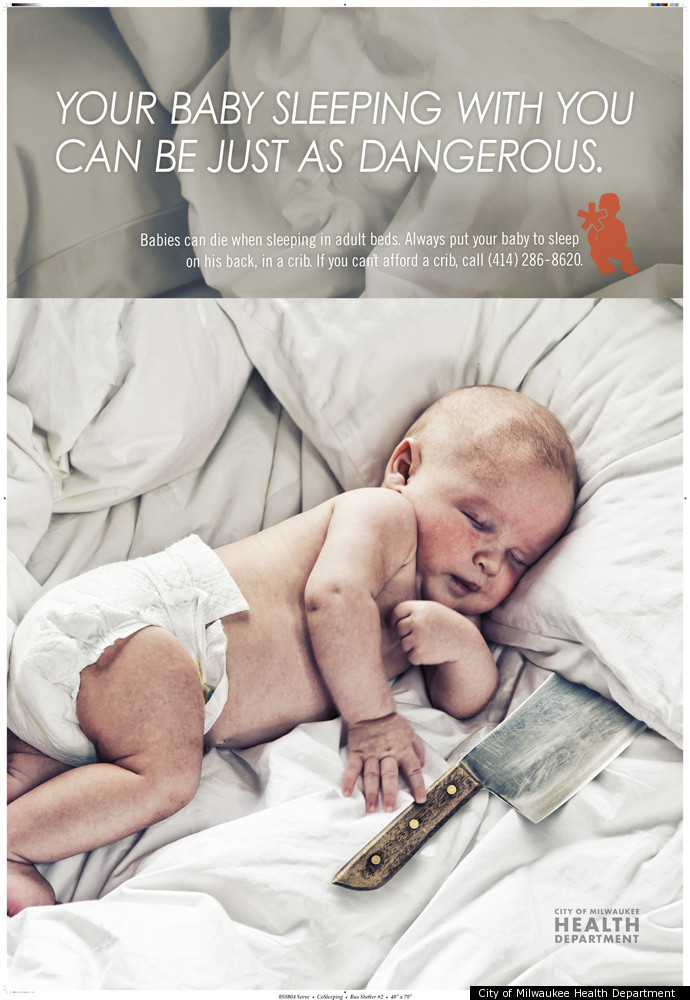Parents have been co-sleeping for millennia, so what’s behind our common practice of making babies sleep alone?A recent post in the Los Angeles Times explained something I didn’t know — that family co-sleeping was common practice in all cultures until the late 19th century:
According to the physician William Whitty Hall, author of a popular 19th-century sleep hygiene book, individuals in co-sleeping societies were like “wolves, hogs and vermin” who “huddle together,” whereas in the civilized West, “each child, as it grows up, has a separate apartment.” Where social sleeping persisted among white people, it was usually associated with poverty and considered a social ill — as in Jacob Riis’s 1890 How the Other Half Lives. One hundred and fifty tenement dwellers, he observed with horror, slept “on filthy floors in two buildings,” and tramps dozed off in the doorways.
Anyone who’s had a baby in the last few decades knows how strenuously doctors warn against co-sleeping. In many states, it’s even illegal to sleep in the same bed with your infant. Parents are warned over and over of the dangers of co-sleeping, and even subjected to hyperbolic ads that liken sleeping with your baby to letting your baby sleep with a butcher knife.

And yet, many parents (including me!) share a bed with their infants. We make sure to remove pillows and blankets and never go to bed with the baby after drinking alcohol or taking medications that cause drowsiness, but we still feel secure in our decision that co-sleeping is better, and often safer, than putting the baby to sleep in a crib or bassinet. Why does co-sleeping persist so tenaciously, in the face of such objections?
Personally, I’m still haunted by the memory of our first newborn. Like most babies, she wouldn’t sleep in her bassinet. She screamed and cried and only slept while she was being held, so for the first two weeks my husband and I slept in shifts. He tended to get longer shifts than me, because I didn’t need to wake him up to feed a crying baby. More than once, I dozed off with the baby in my arms as I sat on the couch. After she slid down once and startled me awake, I traded the couch for an uncomfortable straight-back chair … where I still dozed off, nearly dropping her onto the floor.

Read more:
Too anxious to fall asleep? 7 bedtime strategies to try
We began co-sleeping as a means of survival, but it was quickly apparent that the baby who wouldn’t sleep on her own slept wonderfully with her parents. Even in our sleep we seemed to be aware of her, and we would both wake up in the same exact positions in which we fell asleep.
I’ve never looked back. Sleeping with babies became our normal, even as research began to show that co-sleeping is much safer than we’ve been told. But here’s the truth — I so look forward to the gradual crib-training that we do as the baby gets older. It’s luxurious to have the bed back to ourselves when the baby moves to a crib — because eventually they do move to a crib.
And yet, we’ve never managed to successfully transition any children from our bed to a room of their own. Partly this is because we don’t have enough rooms, but it’s also because none of them sleep well alone. They share rooms with siblings and although they have their own beds, half the time they end up sharing. They sleep better that way, and so do we.
There’s something about sleeping alone that’s so … well … lonely. I hate it when my husband is out of town and I sleep poorly without the familiar weight and warmth of him next to me. It’s normal for humans to sleep together — we’ve been doing it for millennia. What’s new is the practice of sleeping alone, so there’s no wonder that babies and children haven’t caught on yet. I mean, maybe we could Ferberize our way into the evolution of solitary sleep, but that sounds like a lot of sleepless nights for everyone.
I like sleep way too much for that, and so do my kids.








